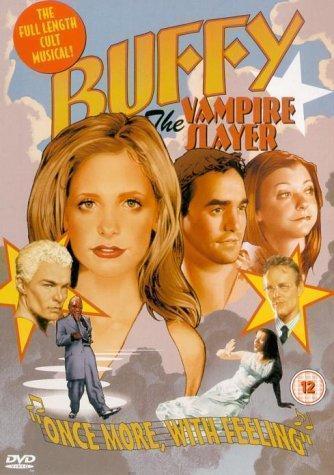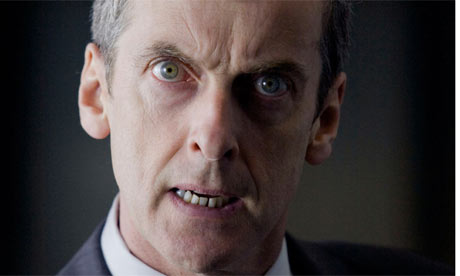Contains spoilers for Buffy and Angel. Not the comic books, though. Those never happened.
Buffy
the Vampire Slayer was famously
asking the question: what if, in a typical horror-movie
monster-chases-girl scenario, the girl turned around and kicked the
monster's ass? But it's also, perhaps less wittingly, asking the
question: what happens when an atheist – someone who disavows the
existence of all things super- or preternatural in the real world –
writes a show about the supernatural?
Of
course, American TV, and especially the WB in the late 90s, is
perhaps not the best forum for a nuanced discussion of faith and
religion. Even so, it's striking how one-dimensional the perspectives
on the supernatural are on Buffy.
Maybe I know too many seminarians (I know a lot of
seminarians), but it seems very odd to me that nobody we know in
Sunnydale reacts to the presence of demons and vampires by turning to
religion. Especially once the show's mythos expanded to encompass an
elaborate lore of gods, resurrection, heaven and hell, and de- and
re-ensouling, the big G remains notable for its total absence. Even
after experiencing a heavenly afterlife, Buffy's only comment about
God's existence is “Nothing solid” (S7E7, “Conversations With
Dead People”). And I for one would find this profoundly
unsatisfying. Once you have come across the First Evil (as worshiped
by an ex-priest, no less!), would your first question not be: So is
there an equivalent primordial good?
On
a metatextual level, of course, this all makes perfect sense. The
premise of the show is not God, religion, or Manichean
dualism fought on a cosmic scale. Metatextually, we know that the
Buffyverse is a world where the supernatural forces of evil operate,
but the question of God is moot, and the source of goodness is
people's love for each other and their willingness to make sacrifices
for the sake of what's right. From the perspective of a viewer
looking in on this world, we can accept this, but once we try to
imagine ourselves truly inside the Buffyverse, the cracks in its
metaphysics begin to appear.
These
cracks show themselves most clearly in late-period Buffy,
when the series starts to sink under the weight of its own mythos.
The show, which had once so brilliantly and wittily allegorized the
trials of growing up as horror-movie monsters, lost its focus and its
direction in the final two seasons. Buffy tries
not to simplistically equate soul with good and soulless with bad,
attempting to explore gray areas and moral ambiguities, but this
winds up pulling the show in hopelessly contradictory directions: if
vamps and demons have the potential to be good, if they are
redeemable to the point of being able to want a
soul, then how is Buffy justified in constantly staking them? Add
what we learn from Angel,
and things get even less coherent. If ensoulment and
goodness/evilness are, as Angel the
supposedly more grown-up show would have us believe, much more
complicated than that, how come Angel yo-yos between Good, ensouled
Angel and Evil, soulless Angelus with, frankly, comical facility?
 |
| Come on, it's a bit silly. |
When
Darla, staked as a soulless vampire, is brought back as a human, the
soul question gets even more inexplicable. If, as established very
early on, “When you
become a vampire, the demon takes your body, but it doesn't get your
soul” (Buffy S1E7,
“Angel”), then why does the resurrected human Darla even remember
her life as a vampire? Is the vampire a new, evil creature occupying
the formerly ensouled body, whose soul is now at peace (as that line
of Angel's would seem to suggest); or is it the same person, the same
consciousness, with some fundamental part removed? Is the soul the
individual's consciousness, their moral compass, an ineffable that
somehow endows humanness? What, finally, is a soul?
This
is, of course, a hugely complex question, to which I do not expect a
coherent real-world answer. In a TV show, however, where the quality
of ensouledness apparently determines whether you deserve to live or
die – whether or not it's morally acceptable for our protagonist to
kill you – we damn well need our terms defined.
 |
| This is... what a soul looks like? |
Perhaps
this kind of moral and metaphysical incoherence is simply an
inevitable result of the Chosen One narrative. (I'm reminded
irresistibly of Harry Potter,
and of the fan
critiques
that read Dumbledore as a nasty, manipulative figure who deliberately
programs Harry to do his bidding, rather than as the wise and kindly
mentor Harry sees. There are counter-readings of the Bible that find
traditional atonement theory similarly abhorrent, arguing that only
an abusive God would sacrifice his own son.) Noting the
Powers-That-Be who guide events on Angel,
I wonder to what extent it's possible to engage questions of Chosen
Ones, prophecies, destiny and so on without resorting to a Calvinist
determinism.
Naturally
there is a metatextual Calvinist element – it's called the writers'
room – and Whedon occasionally nods to this. Of Buffy
S6E17, “Normal Again,” he
has said: “the entire series takes place in the mind of a
lunatic locked up somewhere in Los Angeles, if that’s what the
viewer wants.” In that same interview he admits that the role of
the soul in the Buffyverse is often simply a matter of narrative
convenience; and that, I think, is kind of cheating. When we watch a
show, our assent to its premise is a kind of contract: we will accept
this premise, provided that the show does not flout the narrative
rules on which it is predicated. If a show flouts its own narrative
rules – say, retconning
an entire season as a dream – audiences tend to feel that the
contract has been violated. Altering something as crucial to the
show's whole premise as the function of the soul according to
narrative diktat is, I think, a similar violation.
As
a lover of Buffy and a
theologian, I want Buffy to
be theologically and metaphysically coherent. I want it either
to establish one metaphysical system as true for the world it
portrays, or to
represent a believable variety of beliefs among its characters. The
former is an entirely lost cause; the latter is frustratingly
undercooked. Willow's Judaism is wholly Informed,
and her turn to Wicca is entirely to do with magic. There is no
sense at all of Wicca (or any other religion) as an ethical code,
as a way of making meaning, as a way of personally relating to the
world and others in it.
Ultimately,
this is the same problem I have with the show's self-professed
feminism. Joss Whedon is a proud feminist, and yet in the course of
Buffy some very
unfortunate tropes appear – Bury
Your Gays, Psycho
Lesbian, No
Bisexuals, Token
Minority, general racefail – which cumulatively suggest a
writers' room that just didn't necessarily see the implications of
everything it was doing, perhaps because it lacked the
diversity of viewpoints necessary to provide checks and balances on
overwhelming privilege. Established metatextually, the show's
feminism is taken for granted by all characters in-universe, and it
requires extra work on the part of the viewer to critique its
problematic elements. Perhaps this fundamental incoherence of Buffy's
feminism is tied to its fundamental metaphysical incoherence. Both
seem to stem from the same failings.
 |
| But also, there were really really awesome things. |



